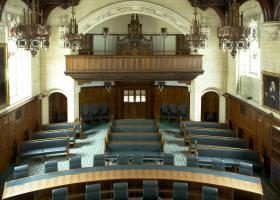Raising the bar
Barrister Nigel Brockley has come to the Bar via involvement in a family business, the restaurant trade and cold calling, as well as the acting profession, and is quite at home in the world of direct access. “I like to win,” he says.
The reintroduction of public access to barristers during the Blair administration after more than a century where barristers could only accept instructions from solicitors heralded a major shake-up of the profession. It was as much a cultural change as a professional challenge – barristers found themselves dealing directly with clients at the outset of cases, scoping out plans of action and, for some, the ultimate challenge of negotiating their own fees. But for Nigel Brockley, as someone who had turned his hand to a number of different activities before becoming a barrister – including extended periods in sales – this was water off a duck’s back. In many ways, his varied career to that point equipped him perfectly for the brave new world of direct access.
After leaving school, where he studied economics, Nigel joined his family property company which had an investment in a large commercial premises in Hoxton (before the area became fashionable) and a hotel near Tenby, in Wales. Always keen to try out different things, Nigel responded to an advertisement to become the manager of a restaurant in Central London; this was Tiddy Dols (which was quite famous in its day) and Nigel was appointed as the manager at the tender age of 20.
With that experience under his belt, Nigel then did a succession of sales jobs. Good with words, persuasive and keen to win (which, of course, are perfect attributes for a would-be barrister as well as a keen rugby player), Nigel has sold anything and everything, from timeshare, computer equipment and water filters to, yes, double glazing. It didn’t faze him that most people said no, because there were always enough people who said yes.
But with a mortgage to pay (he and his brother co-owned a flat), he felt he needed to put himself in a position to earn more regularly. Ignoring the advice of his grandfather who told him not to be a lawyer, Nigel set his sights on becoming a barrister. He borrowed £15,000 from HSBC (the only bank prepared to lend to him) to help pay for a conversion course, and went to Bar School in 1991.
Nigel secured his first six months pupillage at 2 Harcourt Buildings, where he learnt the ropes in a number of practice areas, including personal injury, construction, crime and contractual disputes. For his second six months, he was pupilled to Brian Hurst, then standing counsel for the Nationwide Building Society, adding property, banking and insurance law to his range of specialisms. He became involved in a long-running mortgage fraud case under what is a called a “noting brief” – which is paid work taking notes in a long trial.
At the same time, Nigel took the opportunity to develop his advocacy skills– as well as satisfying his desire to help others who were not in a position to pay for lawyers – by offering to represent clients through the Free Representation Unit (FRU). That gave him a lot of experience in employment cases. Nigel continues to offer his services on a pro bono basis, as part of the Bar Pro Bono Unit.
Nigel was called to the Bar in 1992. After the completion of his training, Nigel was intrigued enough to approach a virtual chambers, Queen’s Bench Chambers. Here, he continued to develop his practice focusing on employment, mortgage disputes, personal injury and general civil litigation.
As a junior, it was hard to make ends meet, so Nigel continued to find other sources of revenue, including doing some door-to-door market research. The chambers was, however, successful and Nigel’s practice grew, undertaking work as a junior with his (then) Head of Chambers, Ian McCulloch, on chancery and commercial cases which were complicated beyond his year of call (the period of time for which he had been a barrister). Nigel’s daily diet of work was varied and a goodly proportion of his clients benefitted from public funding.
However, by 1999, Nigel had “still not got to the place where I wanted to be” and he contemplated a change of career. That involved enrolling on a drama course at the London Centre for Theatre Studies to train to become an actor. He then continued his studies at the City Lit, and secured some acting parts in fringe theatre. But, whilst the smell of the grease paint was an alluring distraction, Nigel recognised that he was more likely to achieve success as a barrister than as an actor.
He saw that No 5 Chambers was advertising as setting up in London, so he applied and was accepted. “That seemed like a good idea to revitalise my career,” he says. It also coincided with marriage, a move to Herefordshire and, subsequently, the arrival of three children. Today, Nigel’s practice is wide-ranging, entirely on the civil side and includes employment, property, regulatory work, insolvency, general company and commercial work.
The introduction of direct access in 2004 suited Nigel well, and he was one of the first barristers to become public access-qualified. The direct contact with clients, which public access offers, enables Nigel to work with a client to devise a litigation strategy which meets a client’s objectives in both a timely and affordable way – it is not charity but it does reflect a recognition that not everyone can afford to instruct a big City firm of solicitors. Nigel notes that public access work can at the same time be both tricky and rewarding, as he explains: “You are wearing two hats: there is an advisory and facilitative role which is inseparable from the quasi-pastoral role associated with the peaks and troughs of the litigation process.”
Reflecting on the path he has taken, Nigel is both pleased and philosophical. At various points there have been significant challenges, as when the state of the family’s business affairs were parlous and Nigel found himself (along with his brother) being saddled with a significant debt to repay. This might have brought his chosen career to a premature end - not for Nigel, he dusted himself off and got on with it.
Nigel’s success in his career is not something he takes lightly; it has taken hard work and a commitment to develop and expand his practice base and he recognises that in his client’s eyes that he is only as good as the last case that he has “won”. Nigel sees his 25 years at the Bar as having been marked by an elusive freedom to act in a client’s very best interests, unencumbered by the business rationale of working within a traditional commercial environment. He acknowledges some great successes (and the odd failure too), but his abiding concern has at all times been to persevere in the face a difficult legal argument.
It is a truism to say that he likes to win. As he says: “I am very resilient in the face of adversity and keep going where others might give up.” A helpful precept, you might think, for this barrister’s career, which has been professionally and personally rewarding in equal measure.

Nigel Brockley - Direct Access Barrister @ 


